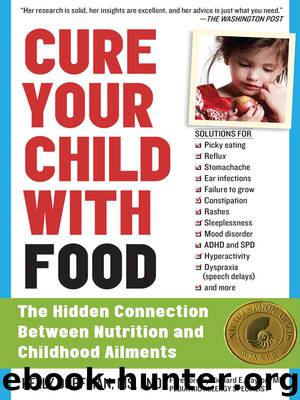Cure Your Child with Food! by Kelly Dorfman

Author:Kelly Dorfman
Language: eng
Format: epub
Publisher: Workman Publishing Company
Published: 2013-04-20T04:00:00+00:00
THE CONNECTION BETWEEN SUGAR AND HYPERACTIVITY
Was sugar making Tyler hyperactive? The connection between sugar consumption and hyperactivity has a long, checkered past. Most pediatricians claim there is no connection, and the American Dietary Guidelines echo that sentiment. A closer look at the research suggests a different story. It is true that high sugar intake alone does not appear to cause hyperactivity in most children, BUT—and it is a big but—it is a factor for some children. There is often a subgroup of children in studies who do respond poorly to sugar. It is just not a majority of children, so the data gets lost in the general findings. Clinically, I certainly see children who get hyperactive from eating too much sugar, and their parents notice also. When you are evaluating one child, it is hard to say whether his hyperactivity is caused by his eating too much sugar or by the fact that he is taking in too few nutrients because his diet contains so many empty calories from sugar. Studies done in juvenile detention centers where the participants could be watched carefully found that improving diets by taking out sweets reduced aggressive and “deviant” behaviors significantly. My bottom line is this: Even if sugar has not been proven to cause aggression and hyperactivity, it certainly cannot hurt to consider improving the diet before adding medication.
Because I understood just how overwhelmed Cathy was, I was reluctant to ask her to make radical changes in her kids’ diets right away. Replacing sugar with braised cabbage, whole-grain muffins, and other healthy foods would have been too much. So all I suggested in this first round of treatment was to take all of her kids off all added sugar for two weeks. I told her to think about this as “a mini science experiment” that would last for only fourteen days. (Sometimes it’s helpful to think of changes to the diet in time segments; trying something new might not feel as frightening if you know there’s an endpoint.) Because all of her kids’ diets were poor, we would deal with the family as a whole.
They could eat fruit, but not fruit juice. All dessert items (such as ice cream, cookies, cakes, candy) and packaged food, including cereals and breakfast pastries, that contained sugar or a sugar derivative were nixed. They could have bread, salad dressings (as if!), or other foods that contained sugar as a minor ingredient. Artificial sweeteners were also forbidden. When artificial sweeteners were added to the food supply, manufacturers argued they would reduce consumption of evil sugar. Instead, the opposite happened; sugar consumption went up and continues to do so.
Some studies have suggested that sugar can be addicting just like drugs. There is evidence that sugar consumption can cause the release of opioids (natural painkillers) and dopamine (a neurotransmitter associated with risk taking and excitement). These effects mimic painkillers and stimulants, and scientists have found evidence of craving, bingeing, and withdrawal when animals are given lots of sugar. The fake stuff does not help, because it keeps our taste buds whetted and wanting more sweet flavor.
Download
This site does not store any files on its server. We only index and link to content provided by other sites. Please contact the content providers to delete copyright contents if any and email us, we'll remove relevant links or contents immediately.
Nutrition for Sport, Exercise, and Health by Spano Marie & Kruskall Laura & Thomas D. Travis(3774)
Nutrition for Sport, Exercise, and Health by Marie Spano & Laura Kruskall & D. Travis Thomas(3723)
The Sprouting Book by Ann Wigmore(3587)
Flavor Flours by Alice Medrich(2861)
Superfood Smoothie Bowls: Delicious, Satisfying, Protein-Packed Blends that Boost Energy and Burn Fat by Chace Daniella(2455)
Memory Rescue by Daniel G. Amen(2418)
Dirty Genes by Ben Lynch(2313)
The Bad Food Bible by Aaron Carroll(2271)
Genius Foods by Max Lugavere(2217)
The Poisoner's Handbook by Deborah Blum(2135)
Good Calories, Bad Calories by Gary Taubes(2106)
The Main Street Vegan Academy Cookbook by Victoria Moran(2078)
The I Quit Sugar Cookbook by Sarah Wilson(2038)
Core Performance Essentials by Mark Verstegen(2009)
Memory Rescue: Supercharge Your Brain, Reverse Memory Loss, and Remember What Matters Most by Amen Dr. Daniel G(1975)
Big Girls Do It Stronger by Jasinda Wilder(1954)
Android App Development by Franceschi Hervé J.;(1841)
Sugar Crush by Dr. Richard Jacoby(1795)
Dr. Colbert's Keto Zone Diet by Don Colbert(1651)
